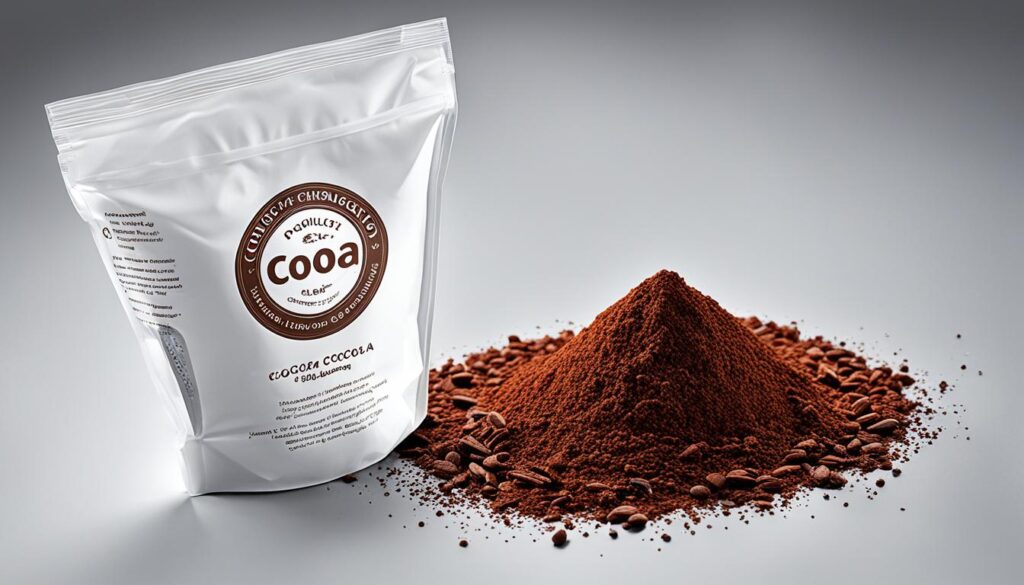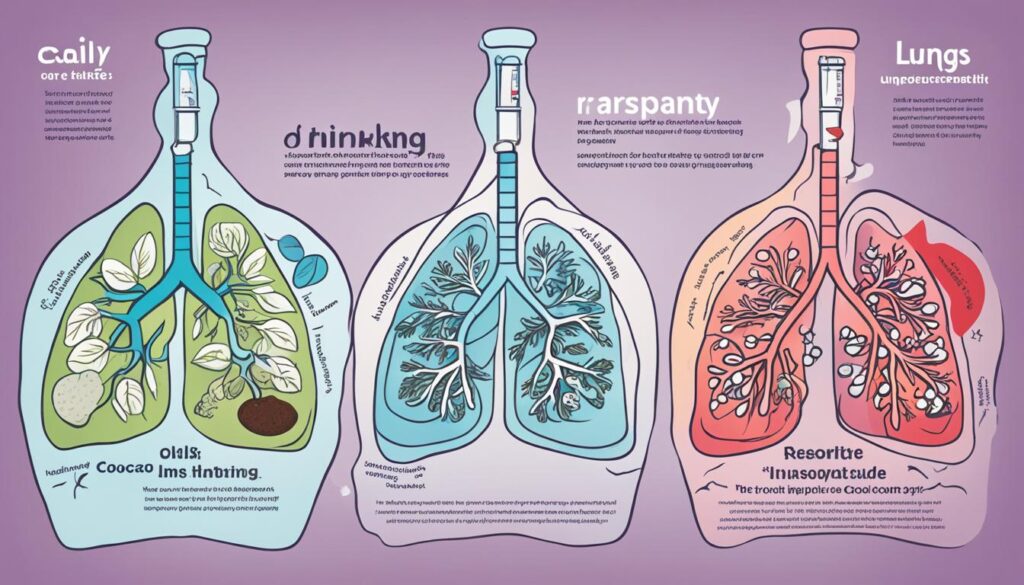Cocoa, the key ingredient in chocolate, has long been celebrated for its potential health benefits. However, recent research has suggested that cocoa may also play a role in improving lung function and supporting respiratory health. This article will explore the potential connection between cocoa and lung function, examining the scientific evidence and considering the implications for individuals seeking natural ways to enhance their breathing and respiratory well-being.
Key Takeaways
- Cocoa is rich in antioxidants and anti-inflammatory compounds that may benefit lung health
- Emerging research indicates that cocoa could help improve lung capacity and airflow
- Incorporating high-quality cocoa into a balanced diet may support respiratory well-being
- Consulting with healthcare professionals is recommended when considering cocoa or other natural remedies for lung function
- More extensive research is needed to fully understand the mechanisms and optimal applications of cocoa for respiratory health
The Potential Benefits of Cocoa for Lung Health
Cocoa, the key ingredient in chocolate, is a rich source of antioxidants, particularly flavonoids, that have been shown to play a crucial role in supporting lung health. These powerful antioxidants can help neutralize free radicals and reduce the oxidative stress that is often linked to various respiratory conditions, including asthma and chronic obstructive pulmonary disease (COPD). By mitigating the damaging effects of oxidation, the antioxidant properties of cocoa may contribute to improved lung function and enhanced respiratory well-being.
Exploring the Antioxidant Properties of Cocoa
The antioxidant properties of cocoa are largely attributed to the presence of flavonoids, such as epicatechin and catechin. These compounds have been extensively studied for their ability to scavenge free radicals, reduce inflammation, and promote overall cellular health. By targeting the root causes of respiratory issues, the antioxidants in cocoa may help improve lung capacity, airflow, and breathing efficiency, potentially benefiting individuals with lung-related conditions.
Cocoa and Inflammation Reduction
In addition to its antioxidant properties, cocoa has also been recognized for its anti-inflammatory effects. Chronic inflammation in the lungs can contribute to the development and progression of various respiratory diseases, including asthma and COPD. The compounds found in cocoa, particularly the flavonoids, have demonstrated the ability to modulate inflammatory pathways, potentially helping to alleviate inflammation within the lungs and improve respiratory function.
By leveraging the combined antioxidant and anti-inflammatory properties of cocoa, researchers are exploring the possibility that this versatile ingredient may offer a natural and complementary approach to supporting lung health and respiratory well-being. As the scientific understanding of the relationship between cocoa and lung function continues to evolve, the potential benefits of incorporating this unique food into a healthy lifestyle are becoming increasingly intriguing.
Understanding Lung Function and Respiratory Issues

Lung function refers to the ability of the lungs to effectively take in and exchange oxygen and carbon dioxide. Factors such as lung capacity and breathing efficiency play a crucial role in overall respiratory health. These factors determine how efficiently the lungs can perform their vital role of gas exchange, which is essential for maintaining optimal bodily function and supporting overall well-being.
Lung Capacity and Breathing Efficiency
The lung capacity is the maximum volume of air that the lungs can hold, while breathing efficiency reflects how effectively the respiratory system can move air in and out of the lungs. Factors like age, genetic predisposition, and lifestyle habits can influence an individual’s lung capacity and breathing efficiency, which in turn can impact their respiratory function and overall physical performance.
Common Respiratory Conditions and Their Impact
Unfortunately, many common lung and respiratory problems can significantly impair lung function and lead to various troubling symptoms. Conditions like asthma, chronic obstructive pulmonary disease (COPD), and respiratory infections can compromise the lungs’ ability to effectively take in oxygen and expel carbon dioxide. This can result in breathing difficulties, reduced exercise tolerance, and other problematic manifestations that can negatively impact an individual’s quality of life and overall health.
Can cocoa help in improving lung function?

Research Findings on Cocoa and Lung Function
Emerging research suggests that cocoa may have the potential to improve lung function and support respiratory health. Several studies have indicated that the antioxidant and anti-inflammatory properties of cocoa may help to enhance lung capacity, improve airflow, and alleviate symptoms associated with respiratory conditions. However, more extensive research is needed to fully understand the mechanisms by which cocoa may benefit the lungs and to determine optimal dosages and delivery methods.
A study published in the Journal of Thoracic Disease found that regular consumption of cocoa-based products was associated with improved lung function and reduced risk of respiratory diseases, such as asthma and chronic obstructive pulmonary disease (COPD). The researchers propose that the flavonoids present in cocoa may help to reduce inflammation and oxidative stress in the lungs, leading to enhanced airflow and respiratory health.
Another study conducted by the University of California, San Francisco examined the effects of cocoa on lung function in individuals with COPD. The results suggested that consuming cocoa powder daily for 12 weeks led to significant improvements in lung capacity and exercise tolerance, potentially due to the antioxidant and vasodilatory properties of cocoa’s flavonoids.
While these findings are promising, more research is needed to fully understand the potential lung benefits of cocoa and to determine the most effective ways to incorporate it into a comprehensive respiratory health plan. Healthcare professionals can provide valuable guidance on individualized approaches to using cocoa or other natural remedies to support lung function.
The Role of Flavonoids in Lung Health

The flavonoids present in cocoa, such as epicatechin and catechin, are believed to play a significant role in the potential lung health benefits of cocoa. These antioxidant compounds have been shown to possess anti-inflammatory properties and may help to improve lung function by reducing oxidative stress and promoting healthy airway function. Ongoing research is exploring the specific mechanisms by which cocoa flavonoids may contribute to improved respiratory health.
Studies have indicated that the flavonoids in cocoa may offer lung-supporting properties by combating inflammation and oxidative stress, two key factors that can compromise respiratory function. These beneficial compounds found in cocoa may help to enhance lung capacity, improve airflow, and potentially alleviate symptoms associated with various respiratory conditions.
Researchers are particularly interested in understanding how the flavonoids in cocoa interact with the lungs and respiratory system. The anti-inflammatory and antioxidant effects of these compounds may play a crucial role in supporting overall lung health and potentially mitigating the impact of certain respiratory diseases.
As the scientific exploration of cocoa flavonoids and lung health continues, healthcare professionals and researchers alike are eager to further elucidate the specific mechanisms and potential applications of these natural compounds in supporting respiratory well-being. The promising findings suggest that incorporating high-quality cocoa into a balanced lifestyle may be a worthwhile consideration for individuals seeking to support their lung function through natural means.
Incorporating Cocoa into a Healthy Diet

Incorporating high-quality cocoa products into a balanced and nutritious diet can be a practical way to potentially support lung function and respiratory health. When selecting cocoa, it’s essential to choose minimally processed varieties that retain the maximum amount of beneficial flavonoids, the key compounds believed to contribute to cocoa’s potential lung-supportive properties.
Choosing High-Quality Cocoa Products
Not all cocoa products are created equal, and it’s crucial to prioritize quality over quantity. Look for cocoa powders, dark chocolates, or cocoa nibs that are organic, fair-trade, and minimally processed to ensure you’re getting the most potent source of the compounds that may help improve lung function. Avoid highly processed, sugar-laden chocolate products, as they may diminish the potential health benefits.
Moderation and Balance in Cocoa Consumption
While cocoa can be a delightful addition to a healthy diet, moderation is key. Experts recommend incorporating cocoa as part of an overall balanced and nutritious lifestyle, complementing it with other lung-supportive foods and practices. Overconsumption of cocoa can lead to undesirable effects, so it’s important to find the right balance that works for your individual needs and health goals.
By carefully selecting high-quality cocoa products and incorporating them into a balanced diet, you can potentially harness the lung-supporting benefits of this versatile ingredient while enjoying its delicious flavors. Remember to consult with healthcare professionals to ensure the safe and appropriate use of cocoa or any other natural remedy for respiratory health.
Lifestyle Factors Affecting Lung Health

While the potential benefits of cocoa for lung health are intriguing, it’s important to recognize that various lifestyle factors can also significantly impact respiratory function. Two key aspects that warrant attention are smoking and air pollution, as well as the role of exercise in supporting respiratory fitness.
Smoking and Air Pollution
Smoking and exposure to air pollution are well-known contributors to respiratory problems. These harmful environmental factors can damage the lungs and impair breathing, leading to conditions like chronic obstructive pulmonary disease (COPD). Individuals who abstain from smoking and minimize exposure to polluted air are more likely to maintain healthy lung function and overall respiratory well-being.
Exercise and Respiratory Fitness
On the other hand, regular physical activity has been shown to have a positive impact on lung health. Engaging in exercise can improve lung capacity, strengthen the respiratory muscles, and enhance overall respiratory fitness. This is particularly beneficial for individuals with respiratory conditions, as improved lung function can lead to better breathing, increased exercise tolerance, and a higher quality of life.
Maintaining a balanced, healthy lifestyle that includes a nutritious diet, regular physical activity, and avoidance of harmful environmental factors can play a crucial role in supporting lung function and respiratory health. By adopting such a holistic approach, individuals may be able to complement the potential benefits of cocoa and other natural remedies to optimize their respiratory well-being.
| Lifestyle Factor | Impact on Lung Health |
|---|---|
| Smoking | Significantly damages the lungs and impairs breathing, leading to respiratory conditions like COPD. |
| Air Pollution | Exposure to air pollutants can also contribute to respiratory problems and lung damage. |
| Regular Exercise | Improves lung capacity, strengthens respiratory muscles, and enhances overall respiratory fitness. |
By understanding the impact of these lifestyle factors on lung health, individuals can make informed choices to support their respiratory well-being and potentially amplify the benefits of natural remedies like cocoa.
Cocoa and Other Natural Remedies for Respiratory Support
While cocoa may offer potential benefits for lung health, it is not the only natural remedy that may support respiratory function. Other complementary therapies, such as herbal remedies, breathing exercises, and certain dietary supplements, have also been explored for their potential to enhance lung function and provide respiratory support.
Complementary Therapies for Lung Health
In addition to the potential benefits of cocoa, natural approaches to improving lung function may include a variety of complementary therapies. Herbal remedies containing compounds like ginger, turmeric, or echinacea have been studied for their anti-inflammatory and antioxidant properties, which may help alleviate symptoms associated with respiratory conditions. Breathing exercises, such as diaphragmatic breathing and pursed-lip breathing, can also be beneficial for improving lung capacity and respiratory efficiency.
Dietary supplements containing nutrients like omega-3 fatty acids, vitamin C, or magnesium have also been investigated for their potential to support respiratory health. These natural remedies may offer a complementary approach to managing respiratory issues, often in conjunction with conventional medical treatments.
It’s important to consult with healthcare professionals when considering any natural or alternative approaches to managing respiratory conditions or improving lung health. They can provide guidance on the appropriate use and safety of these complementary therapies, taking into account individual circumstances and medical history.
Potential Side Effects and Precautions

While cocoa is generally considered safe for most people, it is important to be aware of potential side effects and precautions. Individuals with allergies or sensitivities to cocoa or its components may experience adverse reactions, such as digestive issues or skin irritation. Additionally, cocoa may interact with certain medications, particularly those used to manage respiratory conditions or heart health. Consulting with a healthcare professional is recommended before incorporating cocoa or any other natural remedy into a treatment plan.
Allergies and Sensitivities
Some people may have allergies and sensitivities to cocoa, which can lead to undesirable side effects. These reactions can range from mild digestive discomfort to more severe skin irritations. Individuals with known cocoa allergies or sensitivities should exercise caution and consult with their healthcare provider before attempting to incorporate cocoa into their diet or supplement regimen.
Interactions with Medications
Cocoa may also interact with certain medications, especially those used to manage respiratory conditions or cardiovascular health. The antioxidant and vasodilatory properties of cocoa’s active compounds, such as flavanols, could potentially interfere with the efficacy or dosing requirements of some prescription drugs. It is crucial for individuals taking any medications to discuss the potential interactions between cocoa and medications with their healthcare provider before adding cocoa to their regimen.
Individual Considerations and Consulting Healthcare Professionals
The potential benefits of cocoa for lung health may vary among individuals based on factors such as their overall health status, existing respiratory conditions, and individual physiological responses. It is crucial for anyone interested in using cocoa or other natural remedies to support their lung function to consult with a healthcare professional, such as a pulmonologist or respiratory therapist. These medical experts can provide personalized guidance, take into account individual circumstances, and help determine the most appropriate and safe approach to incorporating cocoa or other complementary therapies into a comprehensive respiratory health plan.
When it comes to consulting healthcare professionals about cocoa for lung function, patients should be prepared to discuss their medical history, current respiratory conditions, and any other relevant factors that may influence their response to cocoa or other natural remedies. By working closely with their healthcare team, individuals can ensure that the integration of cocoa into their overall wellness strategy is tailored to their unique individual factors to consider for cocoa and lung health.
Ultimately, the decision to use cocoa or any other natural supplement to support respiratory health should be made in collaboration with qualified medical professionals. This approach helps to maximize the potential benefits while minimizing any risks or adverse reactions, ensuring a safe and effective path towards improved lung function and overall respiratory well-being.
Future Research Directions and Implications

As the research on the potential benefits of cocoa for lung health continues to evolve, there are several promising avenues for future research on cocoa and lung health. Researchers are eager to further explore the specific mechanisms by which the compounds in cocoa, particularly the flavonoids, may contribute to improved lung function, respiratory fitness, and the management of respiratory conditions. Larger-scale clinical trials and long-term studies are needed to establish the optimal dosages, delivery methods, and potential therapeutic applications of cocoa for respiratory health. The outcomes of this ongoing research could have significant implications of cocoa for respiratory function, potentially leading to the development of natural, complementary approaches to supporting lung function and respiratory well-being.
The exploration of cocoa’s lung-supporting properties aligns with the growing interest in natural and holistic solutions for respiratory health. As individuals seek out alternatives to traditional pharmaceutical interventions, the potential of cocoa as a dietary supplement or complementary therapy could hold immense promise. Further research in this area may uncover new insights into the ways in which the compounds in cocoa can be leveraged to enhance lung capacity, improve airflow, and alleviate the symptoms associated with various respiratory conditions.
In addition, the implications of cocoa for respiratory function could extend beyond individual health benefits. If the positive effects of cocoa on lung health are substantiated through rigorous scientific investigation, it could have significant public health implications, particularly in regions where respiratory ailments are prevalent. Incorporating cocoa-based interventions into comprehensive respiratory health programs or public health initiatives could potentially contribute to improved respiratory outcomes and enhanced quality of life for individuals struggling with lung-related challenges.
Ultimately, the future research directions and implications of cocoa for respiratory function hold tremendous potential. By continuing to explore the mechanisms, dosages, and applications of cocoa for lung health, the scientific community can pave the way for innovative, natural solutions that empower individuals to take a proactive approach to supporting their respiratory well-being. As this area of research evolves, the findings could have far-reaching impacts on the way we understand and address respiratory health challenges, both at the individual and population levels.
Conclusion
In conclusion, the emerging research on the potential benefits of cocoa for lung health is intriguing and holds promise for individuals seeking natural ways to support their respiratory function. The antioxidant and anti-inflammatory properties of cocoa may help to enhance lung capacity, improve airflow, and alleviate symptoms associated with various respiratory conditions. While more research is needed to fully understand the mechanisms and optimal applications of cocoa for respiratory health, incorporating high-quality cocoa products into a balanced, healthy lifestyle may be a worthwhile consideration for those interested in supporting their lung function through natural means.
The key takeaways on the potential benefits of cocoa for respiratory health are that the antioxidant and anti-inflammatory properties of cocoa may contribute to improved lung capacity and better airflow, which could potentially benefit individuals with various respiratory conditions. However, it is crucial to consult with healthcare professionals to ensure the safe and appropriate use of cocoa or other complementary therapies when addressing lung function and respiratory well-being.
As with any health-related decision, it is crucial to consult with healthcare professionals to ensure the safe and appropriate use of cocoa or other complementary therapies. By working closely with medical experts, individuals can develop a comprehensive plan that leverages the potential benefits of cocoa while also considering their unique health status and needs.

Leave a Reply